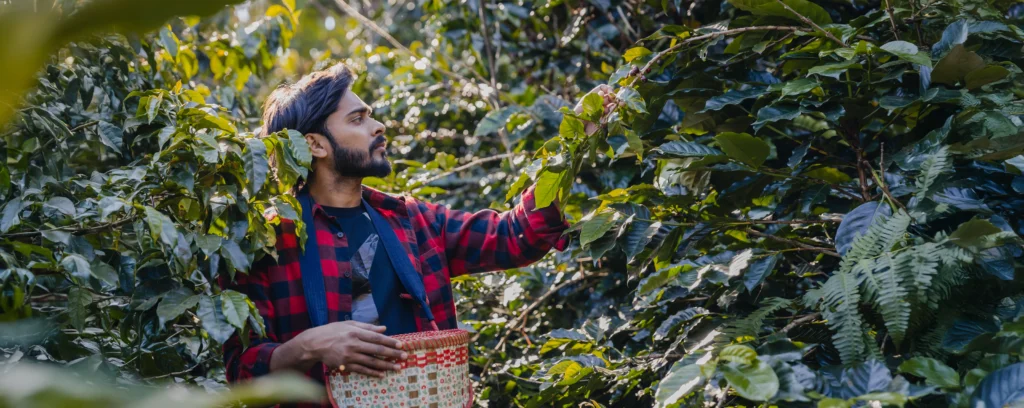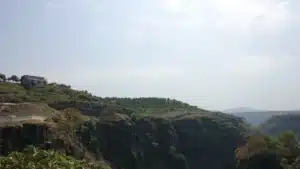There are places that you travel to for the views, and then there are places you travel to for the flavours. Chikmagalur, often called the coffee land of India, fits neatly into both categories. The hills roll endlessly, green and misty, and tucked into their folds are the plantations that made Chikmagalur coffee famous far beyond Karnataka. Spend a few days here and you’ll quickly realise: coffee isn’t just a drink in Chikmagalur. It’s part of the land’s identity, a rhythm to daily life, and—if you let it—a quiet kind of magic.
The Beginning of Coffee in Chikmagalur
The story starts in the 17th century when a saint, Baba Budan, is said to have brought seven raw coffee beans from Yemen and planted them on the slopes of these hills. A small act, but one that would eventually turn Chikmagalur into the heart of India’s coffee culture. Walk around the plantations today, and you can almost feel that history lingering among the shade trees and pepper vines.
What makes the plantations here unique is the mixed farming style. Coffee shrubs grow under taller trees: silver oak, jackfruit, and even wild figs, so the ecosystem feels like a forest more than a farm. The result? Beans that carry subtle notes shaped by this biodiversity.
The Plantation Experience
One of the best ways to understand Chikmagalur’s coffee culture is to step into a plantation yourself. Many estates now welcome visitors, letting you trace the journey from seedling to steaming cup.
A plantation walk is often unhurried. You wander through rows of Arabica or Robusta plants, notice the bright red cherries when they’re in season, and listen to the crunch of dry leaves underfoot. Guides will explain the difference between hand-picking and strip-picking, or why shade-grown coffee tends to have more complex flavours. And then, of course, there’s the tasting session at the end that includes rich, slightly nutty, sometimes even floral depending on the roast.
It’s not hard to lose track of time here. The hills, the scent of freshly ground beans, the easy pace—it all folds together into a kind of calm that feels rare in today’s noise.
Chikmagalur Hill Station Vibes
But coffee isn’t the only draw. The fact that Chikmagalur is a hill station makes the experience even richer. Mornings begin with mist curling over valleys, and evenings usually wrap up in a cool breeze that makes you want to hold on to a hot cup just a little tighter. The weather isn’t dramatic, but it’s steady, like a reliable friend who never lets you down.
And tucked within these hills are trails leading to waterfalls, quiet viewpoints, and even old temples. Sometimes, after a long plantation tour, slipping away for a short trek or drive through winding roads feels like the perfect balance between indulgence and adventure.
Coffee and Food: A Perfect Match
Now, while coffee is the star, let’s not forget the supporting cast. Chikmagalur's famous food has its own little following. The local Malnad cuisine is hearty and flavourful, think akki rotti (rice flatbread), pork dishes, bamboo shoot curry, and lightly spiced gravies that pair beautifully with steamed rice.
If you’re a food traveller, the joy here is in discovering how naturally coffee sneaks into the culinary conversation. Some homestays even serve coffee-inspired desserts, like coffee payasam or spiced coffee cakes. Not every place does, but when you find it, it feels like stumbling upon a secret recipe handed down in whispers.
The Café Scene and Beyond
Over the last decade, Chikmagalur has also seen the rise of boutique cafés. These aren’t flashy; most lean into simplicity, focusing on good brews and serene settings. Some are attached to plantations, others tucked away in town. Sit down, order a cup, and you’ll likely hear the story of the beans right from the owner or barista.
The range is wide. Pour-overs, French press, even cold brews served with ice and a splash of citrus. Each café adds its own twist, but the common thread is pride in showcasing what these hills produce. And honestly, that pride is contagious. You drink the cup a little slower, noticing details you might otherwise overlook.
For those looking to explore more than cafés, there are also a few of the best restaurants in Chikmagalur that weave coffee into their menus in surprising ways. A smoky coffee rub on grilled meat, or a coffee-infused sauce with local vegetables. It might sound experimental, but the flavours usually find harmony.
Stories in Every Sip
What keeps drawing me back to Chikmagalur isn’t just the coffee itself, though. It’s the stories that swirl around it. Farmers who talk about harvest seasons with the same affection others reserve for family milestones. Workers who’ve been tending estates for decades, recalling drought years and bumper crops. Or travellers like you and me, pausing mid-sip and wondering why coffee here tastes just a bit more alive.
Coffee, after all, isn’t just beans and roasting. It’s a chain of effort, patience, and, dare I say, love. And when you’re in Chikmagalur, that chain feels visible, like you’re not just drinking a beverage but participating in a tradition.
A Few Practical Pointers
If you’re planning to dive into this culture yourself, a few things might help:
- Stay at a plantation homestay if you can. Waking up among the coffee shrubs is half the charm.
- Visit during harvest season (usually December to February) to see the estates buzzing with activity.
- Balance your coffee explorations with local treks. Mullayanagiri, the highest peak in Karnataka, is a favourite.
- And, if you’re keen on shopping, don’t just grab beans. Look for local spices too, since pepper and cardamom often grow side by side with coffee.
Why Chikmagalur Coffee Feels Different
So, what makes Chikmagalur coffee feel special compared to other regions? Maybe it’s the altitude, maybe the soil, or maybe the fact that this is where coffee first took root in India. But I think it’s more than that. It’s the combination of land, people, and pace of life. The hills don’t rush. Neither do the farmers. And perhaps that rhythm seeps into the beans themselves, carrying a flavour that tastes unhurried.
And honestly, isn’t that what we’re all craving these days? A little slowness, a little grounding. Something that reminds us life doesn’t always have to be fast to be meaningful.
Conclusion
Exploring Chikmagalur through its coffee isn’t just about drinking cup after cup (though I wouldn’t blame you if you did). It’s about understanding how a landscape and its people have shaped an entire culture around a humble bean. From plantation trails to cosy cafés, from local kitchens to scenic treks, the experience ties itself together like threads in a well-worn tapestry.
If you make the trip, give yourself time to linger. Ask questions, taste patiently, wander without a fixed schedule. Because that’s when the heart of this place reveals itself. And when you finally take that last sip before heading home, you’ll realise why Chikmagalur coffee isn’t just a drink. It’s an experience worth carrying back with you.











